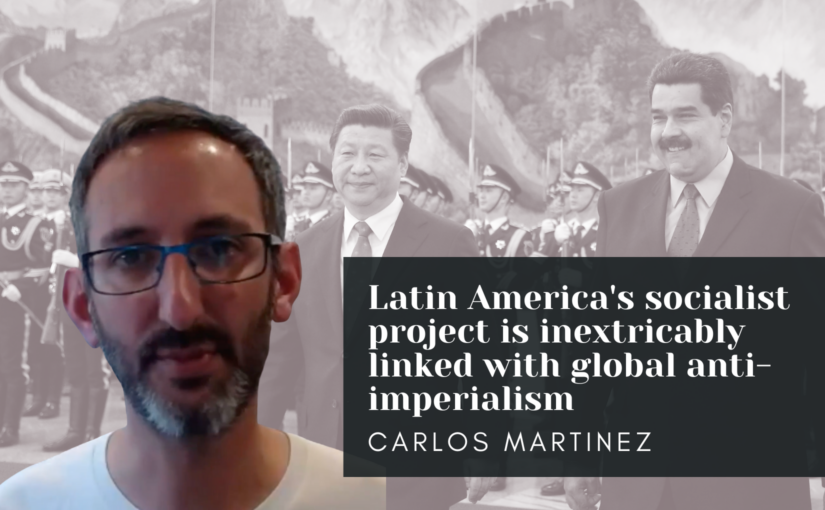Below is the video and text of a speech by Carlos Martinez, co-editor of Friends of Socialist China, introducing our recent event 21st Century Socialism: China and Latin America on the Frontline. Carlos explains the motivation for organising a webinar focused on socialist processes in China and Latin America: that both China and progressive Latin America are building a vision of 21st century socialism, and this is of immense importance and interest for Marxists around the world.
On behalf of Friends of Socialist China, I’d like to thank you all for joining today’s webinar.
I’m not going to speak for long, but I wanted to quickly say something about the motivation for putting on this event. Why China and Latin America?
Of course our platform focuses on China in particular. Not because of our special appreciation for jasmine tea or Ming dynasty pottery, but because, as the largest socialist country, and the largest developing country, and as a rising power, China has a critically important role in terms of the global transition both towards a multipolar framework of international relations, and towards socialism.
And if we’re talking about socialism in the 21st century, it’s obvious we need to discuss China. Having achieved its historic goal of eliminating extreme poverty by 2021, China’s now building systematically towards its Second Centenary Goal: to build “a great modern socialist country in all respects.”
This means moving on from tackling absolute poverty to tackling relative poverty. It means focussing on common prosperity. It means reducing inequality between regions and groups. It means attaining a per capita GDP comparable with the most developed countries. It means every member of the population having access to top-quality education and health care, and having the opportunity to lead a fulfilling life. And it means sustainable development – protecting biodiversity, ending greenhouse gas emissions.
But on this question of establishing a vision of socialism in the 21st century, the peoples of Latin America also have some very important things to say.
Of course revolutionary Cuba has been blazing a trail since 1959. But the US, having failed to prevent the emergence of socialism in Cuba, and having failed to dismantle it or suffocate it – not for want of trying – became very vigilant in stamping out revolutionary movements throughout the continent.
When it comes to fighting socialism and sovereignty in Latin America, the Monroe Doctrine has been in some ways more alive than ever over the past 60-70 years. And Latin America was an important location of the Cold War. The people of Guatemala, of Cuba, of Nicaragua, of Grenada, of Brazil, of Chile, of Argentina, of El Salvador, of Bolivia and many other countries have experienced some decidedly ‘hot’ battles within the Cold War.
But over the last two decades, starting with the election of Hugo Chávez in Venezuela in 1999, progressive governments and movements in Latin America have been exploring new paths towards socialism. Chávez himself coined the phrase ‘socialism of the 21st century’, and he understood it on a national level in Venezuela, but also on a regional level in Latin America, and on a global level.
Chávez recognised that the world was moving in a multipolar – or what he called a pluripolar – direction. That China was emerging as a strong, sovereign, independent power with its own form of socialism. That Russia was recovering from the neoliberal battering to which it had been subjected following the collapse of the Soviet Union. That Iran was gaining strength and pursuing an independent policy. That the countries of Africa, Latin America and the Caribbean were asserting themselves and finding new ways to cooperate.
So Venezuela pursued – and continues to pursue – a policy of building socialism, of shifting economic and political and cultural power away from the elite and towards ordinary Venezuelans. And it has protected this socialist experiment by integrating with a wide family of progressive nations.
Upon being elected, Chávez immediately established close ties between Venezuela and Cuba. Then the election of Lula in Brazil in 2002, the victory of the Movimiento a Socialismo in Bolivia in 2005, the victory of Rafael Correa’s Citizens’ Revolution in Ecuador in 2006; the Sandinistas’ return to power in Nicaragua in 2007: these processes all supported and strengthened one another.
And this vision wasn’t only regional; it was global. Chávez very explicitly stood for the militant unity of anti-imperialist forces worldwide, because he knew that our collective strength was necessary to create a space for development, for progress, for socialism.
And that project continues. Today, the socialist-oriented governments in Latin America stand with China against the various slanders hurled at it by the US and its allies. They stand with Russia against the expansion and aggression of this US-dominated nuclear alliance that is NATO.
So the process of building socialism in Latin America has always been linked to the global socialist and multipolar project in which China has such an important role. And that’s why we thought it would be valuable to explore these themes together.


Informative and encouraging.
There is strength in solidarity and a practical end to be met by way of applied socialism. I am so hopeful that China and Latin America can stand in solidarity; along with Russia, to combat the evils of imperialism, while at the same time leading the way towards a global socialism on the behalf of all people everywhere.
In todays world the need for solidarity between socialist nations is greater than ever as is the need for them to help socialists in other countries that are fighting for socialism and justice. The world as a whole is approaching a tipping point and socialists have a duty to ensures it tips in favour of peace, social justice and an end of hegemony.